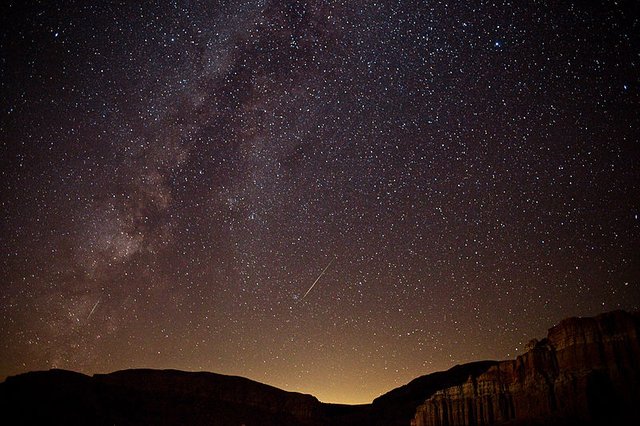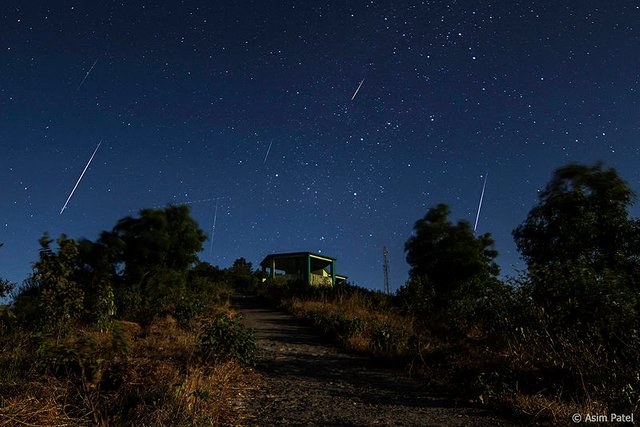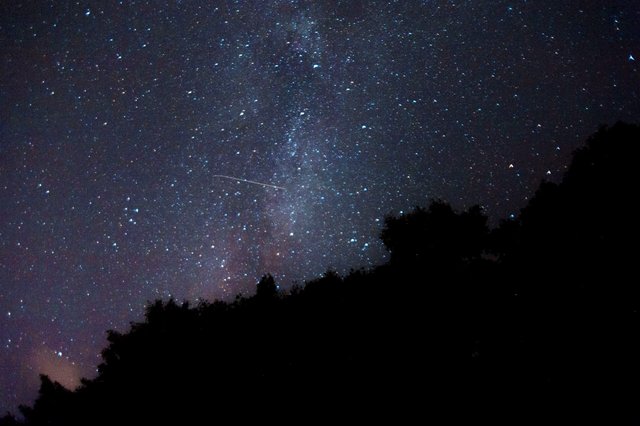Let's Learn Something Cool - Meteor Showers
Ok, as you might remember my first post for 2018 was about the moon and I also referred to meteor showers, the Quadrantids that will be visible over the night sky of 3rd January (that is tonight). I'll be explaining a bit the meteor shower phenomenon and the distinction between meteors and meteoroids.
(Image from: commons.wikimedia.org - Author, Asim Patel - License)
First things first, meteor - meteoroids - meteorites
My Greek anscestors had the word μετέωρον (me-te-o-ron) to describe phenomena in the sky. This word gave the name to meteors, meteoroids and meteorites. Did you get confused? Well, basically they are the same thing, make-a-wish material (or shooting stars if you like).
They all start as meteoroids
Meteoroids are rocky fragments of comets or asteroids. As they travel through space, they crash into the Earth's atmosphere and start burning through friction. Imagine being hurled into a deep swimming pool at top speed. Your body would get severely burnt, that's what happens to meteoroids when they leave the "empty" space and enter the atmosphere as fast as several hudreds to thousands miles per hour. They bump into the atmospheric molecules and friction damages them really badly, leaving a shiny trail behind them. It's then when a meteoroid becomes...
A meteor
Meteors never get to touch the ground. They are usually small like pebbles and they get totally burnt out before making it to the ground. If, though, some meteoroids are big enough (like really big), they can get through the atmosphere losing a lot of their mass, but a piece of them will eventually make it to the ground and they become what we call...
Meteorites
Meteorites are very big, rocky masses that hit the Earth and leave a crater as a souvenir. One of the biggest impact craters on the planet is the one in Arizona, which is also a famous tourist attraction. It measures 50,000 years on Earth and was created after an impact with an iron-nickel mass as big as 50 meters in diameter. The crash left a crater with a one-kilometer diameter.
Fireballs
Occasionally, some meteors are too bright and are then called fireballs. Their brightness might be such that makes them visible even during day time. Fireballs can be also accompanied by sounds, just like lightning is followed by thunder.
This celestial fire-show takes place 80-110 kilometers above our heads as the Earth gets "attacked" by meteoroids on a daily basis. The debris getting to its surface like dust can weigh up to 44 tons! (The Earth is getting fatter every day 😋) But our planet is not the only one who takes part in this peculiar stone-fight. They hit other celestial bodies of our solar system too.
Meteor showers
Unlike typicals showers, they have nothing to do with water. Meteor showers happen when lots of meteoroids fall on the Earth around the same time. Their names come from the constellation near which the shower can be viewed. Meteor showers follow time patterns, they usually happen annually or whenever a comet's trail of rubble meets the Earth's orbit.
Some of the most well-known showers are the Perseids, the Leonids, the Aquarids and the Orionids (Halley), and the Taurids.

(Image from: commons.wikimedia.org - Author, Ian Norman- License)
The Quadrantids
Whereas the above meteors originate from comets, the Quadrantids are asteroid leftovers from the asteroid 2003 EH1. They were first seen in 1825 and their radiant (the point where they appear to come from) is the Quadrans Muralis (a constellation that no longer exists). They are also named Bootids, from the constellation of Bootes. The constellations are not the points where the shower is visible, but only the seemingly "source" of the meteoroids. The light show is visible across the whole sky.
The Quadrantids show every early January and peak (when the most meteroids fall) for only a few hours, unlike most showers that their peak lasts for a couple of days. If the environmental conditions are perfect, you can see from 60-200 meteroids per hour during peak time. They are also more impressive than other showers, as they usually produce fireballs that last longer and shine brighter than other meteroid streaks.
Who are lucky enough to see them tonight?
If you live in the Northern hemisphere, chances are you'll get to see them, on condition that you're a night owl or just willing to sacrifice your sleep. The Quadrantids are expected to peak at 4 p.m. EST (2100 GMT). So put a warm blanket around your shoulders and get out to enjoy the show!
Here is a guide with meteor showers for the new year provided by earthsky.org
References
starchild.gsfc.nasa.gov
space.com
timeanddate.com
solarsystem.nasa.gov_1
solarsystem.nasa.gov_2
Thank you for stopping by and reading this post. If you want to see more of my stuff, you can go through the links below:
- Trolls Around The Solar System (Part 4 - The Asteroid Belt)
- A New Year, A Full Moon And Belated New Year's Fireworks
- A 2017 Review And A Happy New Year!
- Let's Learn Something Cool - My Red Is Not The Same As Yours
- Diamonds And Rust - A Short Story Of Science Fiction
Until my next post,
Steem on and keep smiling, people!




Hmm... I really didn't know the difference between a meteor and a meteorite. Well, I hope we never get to see a meteorite hit this planet.
Actually, Earth gets hit very often. Of course these are small size meteorites, and most of it is destroyed in the atmosphere.
I've been to a lecture given by an astronomer who had a job to go to particular Australian desert to search for meteorites - good job isn't it? :D
Cheers!
I think he didn't read this part: the Earth gets "attacked" by meteoroids on a daily basis
Thanks for pointing it out :P
I remembered I got this photo from last year on Letenka, on Fruska Gora mountain in Serbia.

I was on astronomers camp and this photo was focused on a milky way stripe that was clearly visible. But I was happy of that interruption by shooting star that entered in my frame! :)
This is a really beautiful picture!! Thank you for sharing it here!! :D
Meteorites hit the earth, there have been some rare cases of injuries reported too. They are not that dangerous.
You accuse me of not reading, but I read every word.
So it is possible for a meteorite to hit the Earth surface and leave a crater. I hope a large one big enough to create such crater as depicted in the image never fall again.
Anyways, meteoroids are different from Meteorites.
Meteoroids never touch the surface of the earth in an extremely massive form but meteorites can. ;)
Cheers!
Well, from your comment I got that you understood something wrong, because meteorites fall on earth every year, they are just not so common.
Have a great day! And thank you for your time :)
"Meteorites are very big, rocky masses that hit the Earth and leave a crater as a souvenir." - We were all right at the same time, with a small misunderstanding.
Well, I feel obligated to defend honor of us all. So I will try to put it in few lines :)
4)Fireballs are meteors that go into the atmosphere too steep so they burn out and explode with a bang (you can google: Tunguska event)
image taken from planetbrey.com/meteorite_images/pultuskpeas_thumb.jpg
All the best ;)
@svemirac @ruth-girl thanks for the clarification guys. You guys are amazing. :)
Since I have never come into contact with this field of science, I am very much pleased with this well-summarized article. Thx for your interesting contribution to steemstem. :)
Best,
mountain.phil28
Thank you so much for your time @mountain.phil28!! I really appreciate the support! :)
It was a pleasure! ;)
If you have some spare time and interests in various scientific/educational topics, feel free to have a read of my posts. I would be honored. :)
Best,
mountain.phil28
Oh, I will have look ;)
I like the idea that earth get's something to eat - getting fat as you expressed it - :-)
actually I am not a night owl, so I miss all the good things happening in the sky. Therefor I appreciate someone telling me and repeat the sky & space happenings to me. ... Tonight is an exception (it's late!!) and I am still on vacation mood.
Was a really good article, thanx!
Thank you very much for reading!! :)
If you do happen to see any meteors tonight, let me know. The skies are cloudy over Greece tonight, so I will definitely miss it.
You're welcome!
Same here, it was stormy and raining cats & dogs. No sky whatsoever :-( - I am located in the northern part of Germany and I have the feeling that during winter we hardly have any blue or clean sky. And this year it is way to warm. Let's see what the next months will deliver. I guess the coldest time is still ahead. Brr....
Greece sounds nice. How long do you live there?
Oooh, that's too North for my taste :P The cold temperatures and gloomy skies is not something I could handle for more than a month.
I've lived in Greece all my life, so you can tell that almost no place can beat the Mediterranean climate for me :P
I've never been there :-( But I love all mediterranean places and let me being warmed by the sun & low breezes. Lucky you!
I consider myself lucky too :P
I hope sometime you get to visit the countries around Mare Nostrum, they will look and feel totally different to you! :)
Growing up in a superstitious society was fun with the tales that accompany some natural occurrences, e.g. meteors are said to be the souls of the dead :)
The earth getting fat is a fantastic thing, who needs it lean by the way? Great post.
Those tales have always amazed me (it's my mum of course, she would buy me plenty of books with myths and legends), why don't you launch a new series with legends of your country? It should be really interesting.
That looks like a suggestion I may just do. Thanks a lot.
Thats absolute cool. Tales by the moonlight. Hahaha. Ere osupa
"The Quadrantids" sounds more like an alien race than fragments from a specific asteroid. Also, I never knew super bright meteors were called fireballs. Thanks for the info.
To me they sound like quadruplets!!
Thank you so much for reading!! :)
Great article! Learning going on over here! I live way out in the forest, away from the light pollution of cities and towns. My wife and I watched the last shower, last month, and counted 2-3 meteors every 20 seconds! Some with tails that lasted for a three-count or more. We have also been fortunate to see a split-tail meteor! It was a really cool experience.
Now I'm jealous!!!!! Never seen so many meteors as you say!!! Where do you live?
SW Missouri, surrounded by the Mark Twain. We've seen some onsies and twosies so far tonight!
It must be a wonderful feeling, calm and relaxing :)
The woods have something scary at night, but shooting stars change all that...
You know, I grew up in/around cities for a good portion of my life. After the military, I wanted something more, away from cities. The woods... have provided such a sense of relief. The woods are only as scary as you make them! They are indeed, magical!
I can feel you, it's almost the same feelings I get whenever I take a hike in nature. My friends love trying out new routes in the mountains of our area.
Relief, exactly... Nature takes away all the bad things and fills your mind with peace!
Very organized and educational post! Keep up with the good work up!
Astrophysicist says: force is strong with this one! ;)
Thank you so much for your kind words! :)
Moonlight will not be helpful... :(
It is good to know though that they are there.
:)
When will trolls discuss on advanced cosmology?
:)
No, it won't :(
As for the trolls, they need to get back from their educational trip first ;)
If Meteorites are fragments of Asteroids, and Asteroids are known to have abundance of earth's rare minerals, these meteorites could be delivering to the earth some goodies you know :).
Maybe we should induce some more showers of meteorites. Instead of going to the asteroid to mine minerals, they would come directly to us.
I read about that asteroid-mining. It could save us the troble if they could come straight to us, but it's kind of difficult. Meteorites are a bit rare.
Perhaps a good alternative would be meteor harvesting, way up higher than our heads :P
Thank you for being here @samminator! :)
Lol. You're quite correct buddy
An interesting read, though it has some superstitious connotation in my home town. I saw meteor last like 15 years ago. Rarely occurs.
Would you like to share those superstitions with us? :)